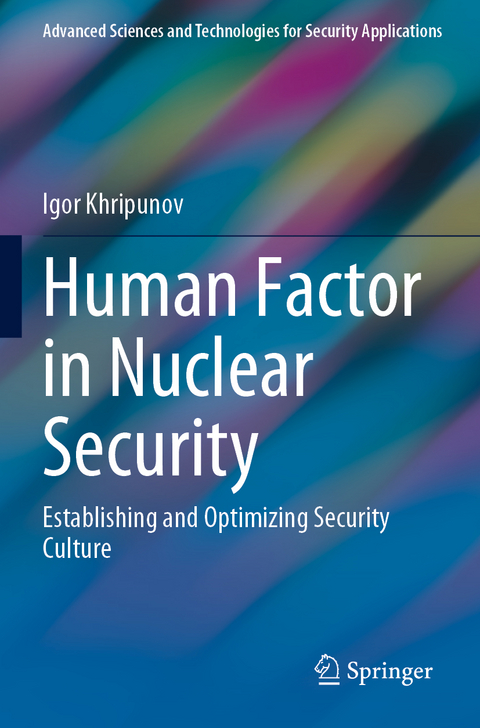
Human Factor in Nuclear Security
Springer International Publishing (Verlag)
978-3-031-20280-3 (ISBN)
This book attempts to look into the genesis of security culture as a concept which emerged with the recognition of the role of the human factor in the context of security. It traces the rapid evolution of security culture into a multi-functional discipline reinforced by supplementary tools such as assessment and enhancement methodologies, reviews practical steps to harmonize nuclear safety and security culture as well as recommends its practical application to address insider threats and their consequences. In addition, it demonstrates how to tailor the generic model of nuclear security culture to meet specific needs of diverse facilities and activities in different countries. Finally, the book discusses several challenges which need to be addressed to make security culture a user-friendly, universal, and sustainable instrument to turn the perception of the human factor as a liability into an asset of nuclear security.
Dr. Igor Khripunov joined the Center for International Trade and Security (formerly the Center for East-West Trade Policy) at the University of Georgia in 1992 and served until July 2018 as a Distinguished Fellow and Director with the Center as well as an Adjunct Professor for the University of Georgia's School of Public and International Affairs. He was also Editor-in-Chief of the "1540 Compass," a journal published between 2012 and 2017 in cooperation with the UN Office for Disarmament Affairs. He is a nonresident fellow at the Stimson Center, USA, and consultant for the International Atomic Energy Agency (IAEA).
His main expertise is the role of the human factor in maintaining stable safety and security at critical infrastructure facilities. In this capacity, Igor Khripunov extensively collaborated with the UN Office for Disarmament Affaires, UN Specialized Agencies, NATO Science for Peace and Security Program, and other international organizations. He participated in developing and validating several IAEA guidance documents in the nuclear security series.
Igor Khripunov has contributed to several books and book chapters on WMD arms controls and nonproliferation, nuclear security, and organizational culture. He has written over 200 articles and op-eds in world media including Arms Control Today, Comparative Strategy, Security Dialogue, Jane's Intelligence Review, Nonproliferation Review, International Journal of Nuclear Security, Problems of Post-Communism, The Bulletin of the Atomic Scientists, Defense News, and other publications.
1. Human Fallibility and its Root Causes.- 2. Rationale Behind Nuclear Security Culture (NSC).- 3. IAEA Model and Methodology.- 4. Initial Steps Toward introduction as a Management Practice.- 5. Interface of Security and Safety Culture.- 6. How to Assess and Enhance.- 7. Application of NSC to Radioactive Sources.- 8. Addressing Insider Threats and Other Possible Applications.- 9. Benefits of NSC in the Nuclear Domain and Beyond.- 10. 2020-2021 Pandemic and Implications for Human Reliability.- 11. A Road Map for Moving Ahead.
| Erscheinungsdatum | 21.02.2024 |
|---|---|
| Reihe/Serie | Advanced Sciences and Technologies for Security Applications |
| Zusatzinfo | XVII, 192 p. 58 illus., 57 illus. in color. |
| Verlagsort | Cham |
| Sprache | englisch |
| Maße | 155 x 235 mm |
| Gewicht | 332 g |
| Themenwelt | Technik ► Elektrotechnik / Energietechnik |
| Schlagworte | Human reliability • human resources management • insider threat • International Atomic Energy Agency (IAEA) • Organizational Culture • Security Culture |
| ISBN-10 | 3-031-20280-5 / 3031202805 |
| ISBN-13 | 978-3-031-20280-3 / 9783031202803 |
| Zustand | Neuware |
| Haben Sie eine Frage zum Produkt? |
aus dem Bereich


